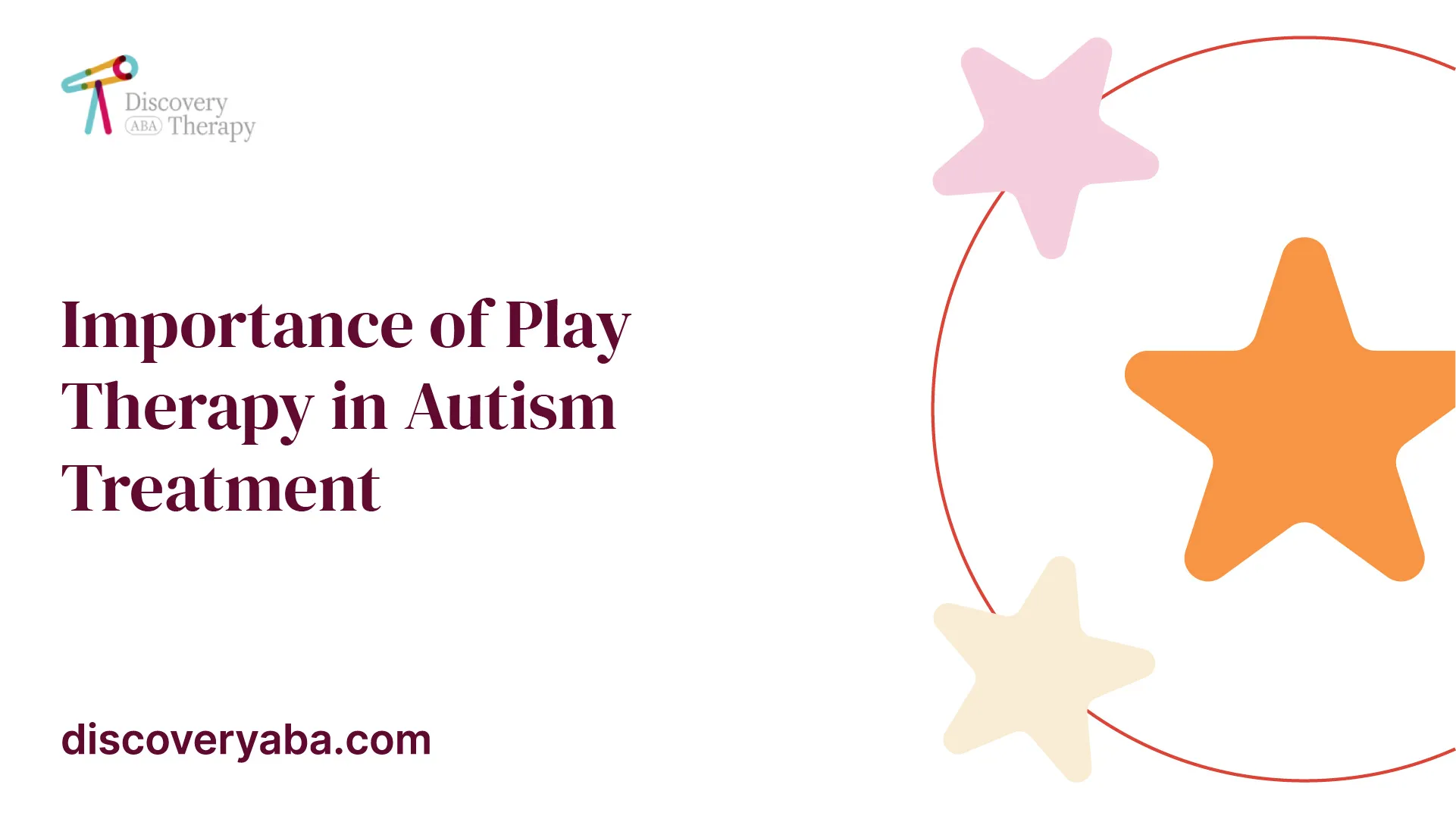Importance of Play Therapy in Autism Treatment
Discover the vital role of play therapy in autism treatment. Enhancing communication and emotional regulation for a brighter future.

Understanding Autism and Play Therapy
When it comes to supporting children with autism, play therapy plays a crucial role in their development and well-being. This therapeutic approach harnesses the power of play to help children with autism develop physical and social skills, enhance communication, and improve social interactions. By creating a safe and supportive environment, play therapy offers a unique opportunity for autistic children to express themselves, explore their emotions, and build essential skills.
Importance of Play Therapy
Autistic children often engage in solitary play, repetitive patterns, and activities that limit their chances to learn through play and explore their own abilities or interests. Play therapy addresses these challenges by providing a structured and purposeful play environment that encourages learning and growth. Through play, children can develop important cognitive, motor, and social skills while having fun and building positive associations with therapy.
Play therapy, such as the Floortime approach, focuses on building relationships, communication, and social skills by leveraging the child's own interests and single-focused attentions. By following the child's lead and engaging in activities that capture their attention, play therapists create opportunities for interaction, problem-solving, and learning in a natural and enjoyable way.

Benefits for Autistic Children
Play therapy is a powerful therapeutic approach for children with autism, offering numerous benefits for their development and well-being. Some of the key benefits include:
- Communication Improvement: Play therapy provides a platform for therapists to encourage verbal and non-verbal communication. Through play, children learn to express themselves effectively, expand their vocabulary, and acquire language skills. This can lead to significant improvements in their ability to communicate and interact with others (ABTABA).
- Social Skills Development: Play therapy offers autistic children opportunities to practice and develop social skills. By engaging in play activities with therapists and peers, children learn essential social cues, turn-taking, sharing, and cooperation. They also gain a better understanding of social norms and expectations, which can improve their ability to navigate social interactions (ABTABA).
- Emotional Regulation Benefits: Play therapy provides a safe space for children to explore their emotions and develop emotional regulation skills. Through play, children can express and process their feelings, learn coping strategies, and build resilience. This can have a positive impact on their emotional well-being and overall mental health (ABTABA).
By aligning with the unique strengths and challenges of children with autism, play therapy offers a holistic approach to their development. It allows them to express themselves non-verbally, develop coping strategies, and gain a deeper understanding of their experiences. Through play therapy, children can build essential skills, foster meaningful relationships, and make significant progress in their overall development.
Approaches in Play Therapy for Autism
When it comes to treating children with autism, play therapy has proven to be a valuable approach. This therapeutic method focuses on leveraging the child's interests and single-focused attention to build relationships, improve communication, and develop social skills. Two commonly used approaches in play therapy for autism are the Floortime approach and play therapist engagement.
Floortime Approach
The Floortime approach, as described by Verywell Health, is a play therapy technique that aims to meet the child at their developmental level and build on their interests. In this approach, the therapist or caregiver actively engages with the child during play, following their lead and joining in their chosen activities. By doing so, the therapist creates opportunities for two-way communication, the development of imaginative ideas, and emotional thinking.
This approach to play therapy emphasizes the importance of building relationships and fostering emotional and intellectual growth in children with autism. Through Floortime, children are encouraged to engage with their environment, express themselves freely, and develop a greater interest in the world around them. Research has shown that Floortime play therapy can significantly improve overall development in children with autism, as noted by NCBI.
Play Therapist Engagement
Another crucial aspect of play therapy for autism is the active engagement of the play therapist. The therapist plays a vital role in creating a safe and supportive environment for the child to explore and express themselves through play. They carefully observe the child's behaviors, interests, and responses during play sessions, adapting their approach to meet the child's specific needs.
Through play therapist engagement, children with autism are given the opportunity to develop reciprocal skills and enhance their communication abilities. The therapist guides the child in expanding their play interactions, fostering social connections, and promoting the development of vital social skills.
By employing the Floortime approach and ensuring active engagement, play therapy provides a unique and effective way to support the growth and development of children with autism. It offers a safe and enjoyable space for children to explore, express themselves, and build essential skills that can positively impact their daily lives.
To learn more about other therapies and interventions for autism, such as speech therapy, occupational therapy, and music therapy, be sure to check out our related articles.
Techniques in Play Therapy
Play therapy for autism employs various techniques to engage children and facilitate their development. Two key techniques commonly used in play therapy are reciprocal skills development and imaginative skills building.
Reciprocal Skills Development
Reciprocal skills development is a fundamental aspect of play therapy for autism. Play therapists engage children in interactive play, focusing on building reciprocal skills, abstract thinking skills, and social communication abilities. Through play, children have the opportunity to practice turn-taking, sharing, and cooperative play, which are essential for developing positive social interactions.
Structured play is often utilized in reciprocal skills development. This approach establishes clear boundaries and rules, providing a framework for children to learn and practice social and behavioral skills. The therapist guides the child through various play scenarios, encouraging them to engage with others, communicate their needs, and navigate social situations.
Imaginative Skills Building
Imaginative skills building is another key technique used in play therapy for autism. Pretend play or imaginative play allows children to explore their creativity, develop abstract thinking skills, and enhance their social and communication abilities.
During imaginative play sessions, therapists create scenarios or provide props that encourage children to engage in imaginative play. This can involve role-playing, creating stories, or participating in make-believe situations. Through imaginative play, children have the opportunity to experiment with different social roles, express their thoughts and feelings, and practice problem-solving skills.
The techniques used in play therapy align with the unique strengths and challenges of children with autism. Play therapy provides a safe and supportive environment where children can express themselves non-verbally, process emotions, and gain a deeper understanding of their experiences. It allows them to explore their inner world, develop coping strategies, and build resilience.
By incorporating reciprocal skills development and imaginative skills building into play therapy sessions, children with autism can experience significant improvements in communication skills, social skills, and emotional regulation. Play therapy serves as a valuable therapeutic approach, enabling children to develop essential skills in a fun and engaging manner. To learn more about the benefits of play therapy for autism, read our article on the importance of play therapy for autism.
Role of Parents in Play Therapy
Parents play a crucial role in the success of play therapy for children with autism. Their active involvement not only strengthens the parent-child relationship but also enhances the overall therapeutic process.
Strengthening Relationships
Participating in play therapy sessions with their autistic child provides parents with an opportunity to strengthen their bond. By engaging in therapeutic play activities together, parents can create a safe and supportive environment for their child, fostering trust, understanding, and emotional connection. This involvement helps establish a solid foundation for effective communication and promotes a sense of security, which is essential for the child's overall development.
Through play, parents can gain a deeper understanding of their child's strengths, interests, and challenges. This understanding enables parents to better support their child's unique needs and provide appropriate guidance outside of therapy sessions. By actively participating in play therapy, parents become an integral part of their child's therapeutic journey, fostering a sense of teamwork and collaboration.
Enhancing Therapeutic Process
Parental involvement in play therapy has shown to enhance the effectiveness of the therapeutic process. By actively engaging in play activities alongside their child, parents can reinforce the skills and strategies introduced in therapy sessions. This consistency between therapy and home environments promotes generalization and the transfer of learned skills into real-life situations.
Parents can also learn valuable techniques and strategies from play therapists that they can implement at home. This knowledge equips parents with the tools to continue supporting their child's development and progress beyond therapy sessions. By applying these strategies consistently, parents can help their child generalize skills, promote language development, and improve social interactions in various settings.
Additionally, parental involvement in play therapy provides an opportunity for therapists to observe and assess the parent-child interaction. Therapists can offer guidance and support to parents, helping them navigate challenges and tailor their approach to better meet their child's needs. The collaboration between therapists and parents ensures a holistic and coordinated approach to the child's development and progress.
By actively participating in play therapy and strengthening the parent-child relationship, parents can play a vital role in their autistic child's progress and well-being. Their involvement not only enhances the effectiveness of play therapy interventions but also fosters a supportive and nurturing environment for the child's overall development.
Finding Play Therapy Resources
When it comes to finding resources for play therapy, the Association for Play Therapy (APT) is a valuable organization to turn to. The APT is a national professional society that provides directories to help families find licensed mental health professionals with training in play therapy, including therapists specialized in working with autistic children.
Association for Play Therapy
The Association for Play Therapy (APT) is dedicated to promoting the use of play therapy as a valuable therapeutic approach for children, including those with autism. Their website offers a wealth of resources, including directories that can assist families in finding licensed mental health professionals with expertise in play therapy. These professionals have received specialized training to effectively incorporate play therapy techniques into their practice. By utilizing the APT directories, families can locate therapists who are knowledgeable in working with autistic children and understand the unique needs and challenges they may face.
Locating Specialized Therapists
When searching for a play therapist for an autistic child, families can refer to the directories provided by the Association for Play Therapy (APT). These directories list licensed mental health professionals who have received training in play therapy. Families can search for therapists in their area who specialize in working with autistic children, ensuring that they receive the specialized care and support they need.
In addition to the APT directories, families may also find play therapy programs available through local early intervention programs or specialized preschool programs. While some of these programs may be covered by insurance, it is important to note that insurance coverage for play therapy may vary. Families may need to inquire about payment options and coverage when seeking out play therapy services for their child.
By utilizing the resources provided by the Association for Play Therapy and other local programs, families can find qualified play therapists who are experienced in working with autistic children. These therapists can offer a range of therapeutic interventions and techniques tailored to meet the unique needs and goals of each child. Play therapy can play a vital role in the treatment and support of autistic children, helping them express themselves, develop social skills, and navigate their world more effectively.
Remember, play therapy is just one of many options available for autism treatment. Choosing the right therapy for your child may involve considering various factors, including their specific needs and preferences. To explore other therapy options, you can refer to our articles on ABA therapy, occupational therapy, speech therapy, and more.
Impact of Play Therapy on Autism
Play therapy has a profound impact on children with autism, offering numerous benefits that contribute to their overall development. Let's explore two key areas where play therapy has been shown to make a significant difference: communication improvement and emotional regulation benefits.
Communication Improvement
Play therapy serves as a powerful tool for enhancing communication skills in children with autism. Therapists utilize play as a medium to encourage verbal and non-verbal communication, leading to significant improvements in language acquisition, vocabulary expansion, and the ability to express oneself effectively. By engaging in play activities tailored to the child's interests and strengths, therapists create an environment that fosters communication growth.
During play therapy sessions, children are encouraged to engage in pretend play, storytelling, and interactive games. Through these activities, children with autism learn to initiate and respond to communication cues, express their thoughts and emotions, and develop a deeper understanding of social interactions. The play therapy process helps children build essential communication skills, such as turn-taking, listening, and understanding social cues.
By improving communication skills, play therapy empowers children with autism to connect with others, express their needs, and build meaningful relationships. This enhanced communication ability has a lasting impact on their daily lives and social interactions.
Emotional Regulation Benefits
Emotional regulation is another area where play therapy demonstrates remarkable benefits for children with autism. Play therapy provides a safe and supportive space for children to explore and express their emotions in a non-threatening way. Through play, children can learn to identify, label, and regulate their emotions effectively.
Play therapy sessions incorporate various play-based techniques that help children develop coping strategies, problem-solving skills, and self-regulation techniques. By engaging in imaginative play, sensory activities, and role-playing scenarios, children with autism gain a deeper understanding of their emotions and learn how to manage them in different situations.
The structured yet flexible nature of play therapy allows therapists to tailor interventions to the specific emotional needs of each child. Therapists help children recognize and express their emotions, teaching them appropriate ways to manage and regulate their feelings. This increased emotional awareness, self-control, and ability to manage emotions contribute to improved emotional regulation skills, leading to greater overall well-being.
By providing a safe and nurturing environment for emotional exploration, play therapy equips children with autism with essential tools to navigate and regulate their emotions effectively.
Play therapy has a profound impact on children with autism, improving their communication skills and enhancing their emotional regulation abilities. Through play-based interventions, children with autism can develop the necessary skills to navigate their world, foster connections, and thrive in their daily lives. The benefits derived from play therapy extend far beyond therapy sessions, positively impacting their overall development and well-being.
References
Does Your Child Have An Autism Diagnosis?
Learn More About How ABA Therapy Can Help
Find More Articles
Contact us
North Carolina, Nevada, Utah, Virginia
New Hampshire, Maine
Arizona, Colorado, Georgia, New Mexico, Oklahoma, Texas
.avif)




































































































